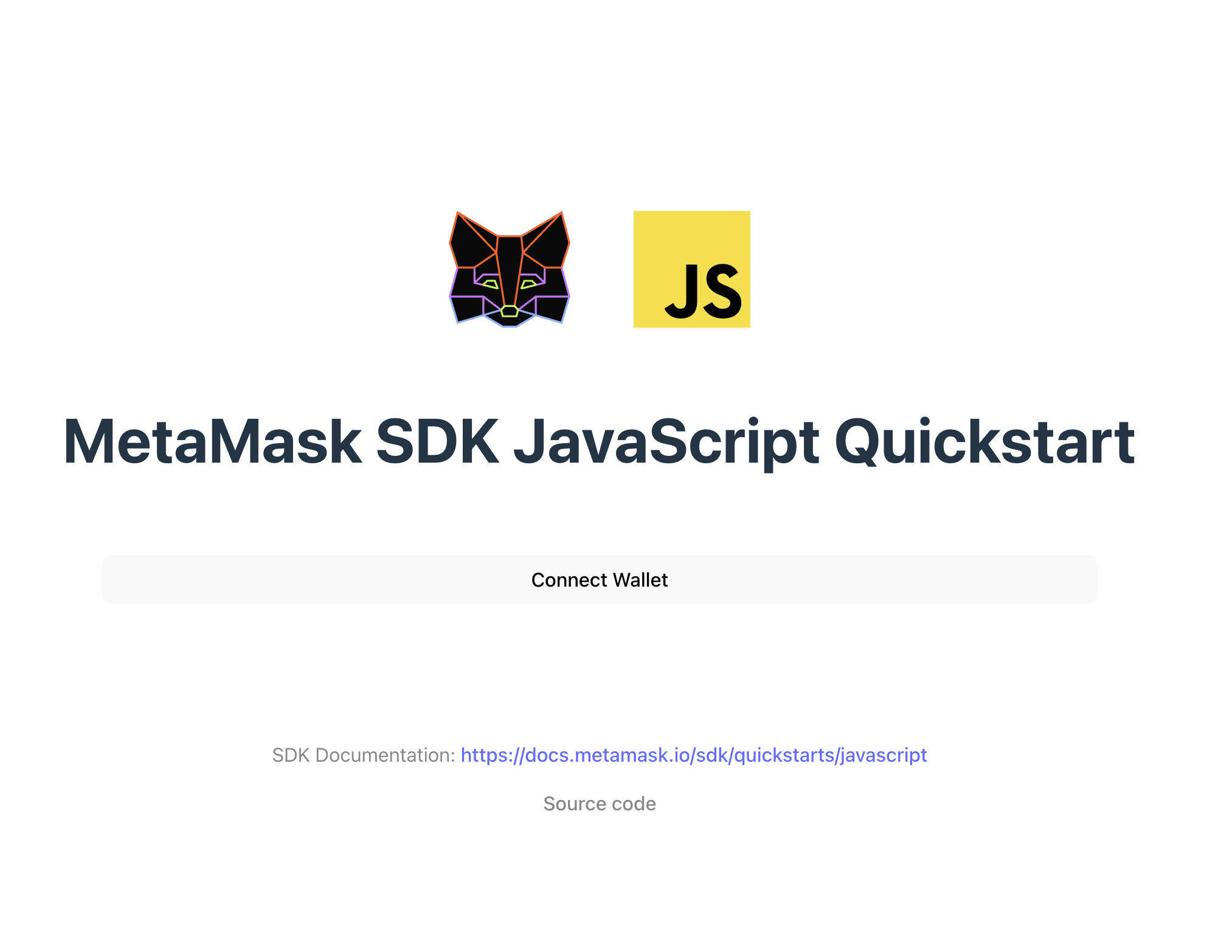Connect to MetaMask using JavaScript
Get started with MetaMask SDK in your JavaScript dapp. You can download the quickstart template or manually set up the SDK in an existing dapp.
Prerequisites
- Node.js version 19 or later installed.
- A package manager installed, such as npm, Yarn, pnpm, or bun.
- MetaMask installed in your browser or on mobile.
- An Infura API key from the MetaMask Developer dashboard.
Set up using a template
-
Download the MetaMask SDK JavaScript template:
npx degit MetaMask/metamask-sdk-examples/quickstarts/javascript metamask-javascript -
Navigate into the repository:
cd metamask-javascriptDegit vs. Git clone
degitis a tool that enables cloning only the directory structure from a GitHub repository, without retrieving the entire repository.Alternatively, you can use
git clone, which will download the entire repository. To do so, clone the MetaMask SDK examples repository and navigate into thequickstarts/javascriptdirectory:git clone https://github.com/MetaMask/metamask-sdk-examples
cd metamask-sdk-examples/quickstarts/javascript -
Install dependencies:
pnpm install -
Create a
.env.localfile:touch .env.local -
In
.env.local, add aVITE_INFURA_API_KEYenvironment variable, replacing<YOUR-API-KEY>with your Infura API key:.env.localVITE_INFURA_API_KEY=<YOUR-API-KEY> -
Run the project:
pnpm dev
You've successfully set up MetaMask SDK.
Set up manually
1. Install the SDK
Install the SDK in an existing JavaScript project:
- npm
- Yarn
- pnpm
- Bun
npm install @metamask/sdk
yarn add @metamask/sdk
pnpm add @metamask/sdk
bun add @metamask/sdk
2. Initialize the SDK
The following are examples of using the SDK in various JavaScript environments:
- Web dapps
- Pure JavaScript (CDN)
import { MetaMaskSDK } from "@metamask/sdk"
const MMSDK = new MetaMaskSDK({
dappMetadata: {
name: "Example JavaScript dapp",
url: window.location.href,
// iconUrl: "https://mydapp.com/icon.png" // Optional
},
infuraAPIKey: process.env.INFURA_API_KEY,
})
<head>
<script src="https://c0f4f41c-2f55-4863-921b-sdk-docs.github.io/cdn/metamask-sdk.js"></script>
<script>
const MMSDK = new MetaMaskSDK.MetaMaskSDK({
dappMetadata: {
name: "Example JavaScript dapp",
url: window.location.href,
// iconUrl: "https://mydapp.com/icon.png" // Optional
},
infuraAPIKey: process.env.INFURA_API_KEY,
})
</script>
</head>
These examples configure the SDK with the following options:
dappMetadata- Ensures trust by showing your dapp'sname,url, andiconUrlduring connection.infuraAPIKey- Enables read-only RPC and load‑balancing. Set this option to your Infura API key.
3. Connect and use provider
Connect to MetaMask and get the provider for RPC requests:
const provider = MMSDK.getProvider()
const accounts = await MMSDK.connect()
console.log("Connected account:", accounts[0])
const result = await provider.request({
method: "eth_accounts",
params: [],
})
console.log("eth_accounts result:", result)
MMSDK.connect() handles cross-platform connection (desktop and mobile), including deeplinking.
Use provider.request() for arbitrary JSON-RPC requests like eth_chainId or eth_getBalance, or for batching requests via metamask_batch.
Common SDK methods at a glance
| Method | Description |
|---|---|
connect() | Triggers wallet connection flow |
connectAndSign({ msg: "..." }) | Connects and prompts user to sign a message |
getProvider() | Returns the provider object for RPC requests |
provider.request({ method, params }) | Calls any Ethereum JSON‑RPC method |
| Batched RPC | Use metamask_batch to group multiple JSON-RPC requests |
Usage example
// 1. Connect and get accounts
const accounts = await MMSDK.connect()
// 2. Connect and sign in one step
const signResult = await MMSDK.connectAndSign({
msg: "Sign in to the dapp",
})
// 3. Get provider for RPC requests
const provider = MMSDK.getProvider()
// 4. Make an RPC request
const result = await provider.request({
method: "eth_accounts",
params: [],
})
// 5. Batch multiple RPC requests
const batchResults = await provider.request({
method: "metamask_batch",
params: [{ method: "eth_accounts" }, { method: "eth_chainId" }],
})
